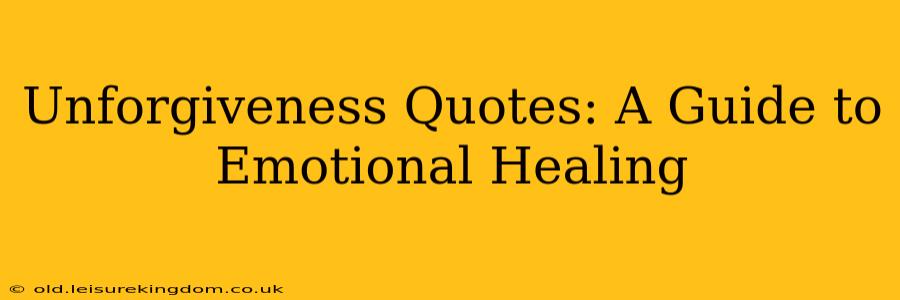Unforgiveness. The word itself carries a weight, a heaviness that resonates deep within us. It's a burden many carry, silently impacting their mental and emotional well-being. This article delves into the profound impact of unforgiveness, explores insightful quotes that illuminate its complexities, and offers guidance on the path toward emotional healing. We'll examine why unforgiveness hurts us more than those we haven't forgiven, and provide practical steps to begin the journey towards letting go.
What is Unforgiveness and Why Does it Matter?
Unforgiveness is more than just holding onto anger; it's a deep-seated refusal to let go of resentment, pain, and hurt caused by another person's actions. It's a choice, often unconscious, to remain tethered to negative emotions, preventing us from moving forward and experiencing peace. The emotional consequences can be significant, leading to stress, anxiety, depression, and even physical health problems. Holding onto unforgiveness is like carrying a heavy backpack filled with rocks – it exhausts us and hinders our progress.
Powerful Unforgiveness Quotes That Resonate
Many wise words have been spoken about the crippling nature of unforgiveness. Here are a few quotes that capture the essence of this struggle and the path to healing:
- "Forgiveness is not forgetting; it's letting go." This quote highlights the crucial difference between forgiveness and reconciliation. We don't have to forget what happened, but we can choose to release the grip of resentment.
- "Holding onto anger is like grasping a hot coal with the intent of throwing it at someone else; you are the one who gets burned." This powerful analogy illustrates the self-destructive nature of unforgiveness.
- "The weak can never forgive. Forgiveness is the attribute of the strong." Mahatma Gandhi's words emphasize the strength and maturity required to let go of past hurts.
How Unforgiveness Affects Your Physical and Mental Health
The impact of unforgiveness extends far beyond emotional distress. Studies have linked unforgiveness to various physical and mental health issues, including:
- Increased blood pressure: Chronic stress associated with unforgiveness can significantly elevate blood pressure, increasing the risk of heart disease.
- Weakened immune system: Ongoing stress compromises the immune system, making individuals more susceptible to illness.
- Sleep disturbances: Ruminating on past hurts often disrupts sleep patterns, leading to insomnia and fatigue.
- Depression and anxiety: Unforgiveness can fuel negative thought patterns, contributing to depression and anxiety disorders.
Common Questions About Unforgiveness:
How do I know if I'm holding onto unforgiveness?
Recognizing unforgiveness can be challenging as it often manifests subtly. Common signs include: persistent anger, resentment, bitterness, difficulty sleeping, recurring negative thoughts about the person who hurt you, and a reluctance to let go of the past.
Is forgiveness the same as reconciliation?
No, forgiveness and reconciliation are distinct processes. Forgiveness is an internal process of releasing resentment and anger towards someone, while reconciliation involves restoring a relationship with that person. You can forgive someone without reconciling with them.
What if I can't forgive someone?
Forgiving someone isn't about condoning their actions or forgetting what happened; it's about releasing the emotional burden you're carrying. If you find it incredibly difficult, consider seeking professional help from a therapist or counselor. They can provide guidance and support in navigating your feelings.
How long does it take to forgive someone?
There's no set timeline for forgiveness. It's a deeply personal journey that unfolds at its own pace. Be patient with yourself and focus on taking small, consistent steps towards healing.
What are the benefits of forgiving someone?
Forgiving others frees you from the emotional burden of resentment and anger, allowing you to experience peace, improved mental health, better relationships, and greater personal growth.
The Path to Forgiveness: Practical Steps for Emotional Healing
Forgiveness is a process, not a destination. It requires conscious effort and self-compassion. Here are some steps you can take:
- Acknowledge your feelings: Allow yourself to feel the anger, hurt, and resentment without judgment. Suppressing these emotions only prolongs the healing process.
- Understand the other person's perspective (if possible): Try to empathize with the other person's motivations, even if you don't agree with their actions. This doesn't excuse their behavior, but it can help you to understand it.
- Practice self-compassion: Be kind to yourself during this process. Forgiveness takes time and effort, and it's okay to experience setbacks along the way.
- Focus on your own well-being: Engage in activities that promote self-care, such as exercise, meditation, or spending time in nature.
- Seek professional help if needed: A therapist or counselor can provide valuable support and guidance during this challenging journey.
Unforgiveness casts a long shadow, impacting not only our emotional well-being but also our physical health. By understanding the impact of unforgiveness and actively pursuing forgiveness, we can pave the way for emotional healing and a more fulfilling life. Remember, forgiveness is a gift you give yourself.

